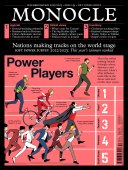
Issue 159
Monocle’s annual Soft Power Survey ranks the major players in the gentler aspects of the diplomacy game. How does your country fare? Elsewhere, we preview a potentially pivotal year for Taiwan, shine the light on Iraq’s unlikely culture push and open the door to the best festive finds from Hudson to Genoa.
In This Issue
Oops! No content was found.
Looks like we no longer have content for the page you're on. Perhaps try a search?
Return Home

